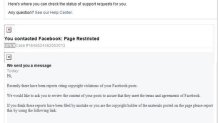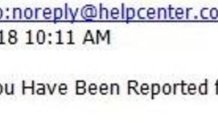Hackers are working tirelessly to steal your data. Whether it’s your identity, passwords, usernames, or bank account numbers, hackers are looking for a way in. Oftentimes they find those passageways by sending fraudulent emails from what appears to be large companies, also known as phishing.
“The fraudsters will use any type of legitimate business in order to do this,” said Charity Lacey from the Identity Theft Resource Center based in San Diego.
One of the latest phishing expeditions is a hack from what looks to be from social media giant, Facebook.
The email’s subject is entitled, “You Have Been Reported for Copyright Content.”
Below the subject is the Facebook logo and the following message with a link:

But upon closer inspection, the email is not what it appears to be.
The email’s sender is from “Faceebook” not Facebook.

Charity from the Identity Theft Resource Center says hackers are using all sorts of companies to try and pull off their phishing scams.
Local
“It could be Facebook. It could be Instagram. It could be your bank,” Charity told NBC 7 Responds.
“They could have a wealth of things that they can dig into and try and expose.”
In an email a spokesperson from Facebook tells NBC 7 some things to keep in mind before clicking on any links from the company.
The first is the company uses “Facebookmail.com” as a common domain name to send notifications.
“If you’re unsure if an email you received was from Facebook, you can check its legitimacy by visiting facebook.com/settings to view a list of security-related emails that have been recently sent,” reads a message posted on the social media’s website.
But regardless of which company is allegedly sending the email there are often clues in plain sight to spot phishing scams.
Here are some tips:
- Look the email over carefully. Are there any misspelled words? Are the email addresses domain names look legitimate?
- Don’t be quick to click on links from unknown companies.
- Don’t give out any personal information or passwords without calling the company first and speaking to someone.
- And, if you are too quick to click then check your bank and credit card statements thoroughly.
Added Charity Lacey from the Identity Theft Resource Center, “You never know what’s on the other side of that link until you’ve clicked on it and typically you can’t undo that.”



